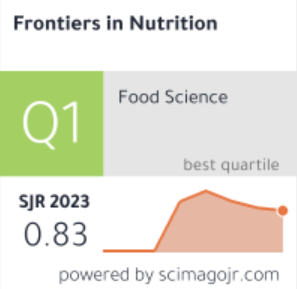摘要
背景:代谢综合征(MetS)在美国中老年人中的发病率不断上升,带来了巨大的死亡风险。饮食是代谢综合征发生的一个关键因素,但很少有研究探讨饮食和生活方式因素对该群体代谢综合征的综合影响。最近,氧化平衡评分(OBS)引起了人们的兴趣,它是衡量氧化状态的指标,包括饮食和体育锻炼。本研究探讨了 OBS 与美国中老年人 MetS 及其各个组成部分之间的关系:方法:分析了美国国家健康与营养调查(NHANES)(1999-2018 年)中 6157 名 45 岁及以上参与者的数据。利用 16 种饮食因素和 4 种生活方式因素计算出 OBS。逻辑回归用于评估 OBS 与 MetS 之间的关联。分别分析了饮食OBS(DOBS)和生活方式OBS(LOBS)与MetS的关系:结果:OBS 四分位数越高,MetS 风险越低(OR 0.25;95% 置信区间[CI]:0.12-0.51;P P = 0.0139),血压(BP)(OR 0.53;95% CI:0.40-0.69;P P = 0.0065)。DOBS 通过降低 BP 和 FG 以及增加 HDL-C 与 MetS 呈反向关系,但对 WC 或 TG 没有显著影响。低密度脂蛋白胆固醇(LOBS)与体重、血压、血脂和总胆固醇的降低以及高密度脂蛋白胆固醇(HDL-C)的升高有关:结论:OBS 与美国中老年人的 MetS 呈反向关系。通过强调富含抗氧化剂的食物、纤维和不饱和脂肪的膳食指南来提高OBS,同时改变生活方式,如定期锻炼、戒烟和适量饮酒,可能对这一人群的MetS预防至关重要。Background: The prevalence of metabolic syndrome (MetS) among middle-aged and older individuals in the U.S. is rising, posing significant mortality risks. Diet is a key factor in MetS development, yet few studies have examined the combined effects of dietary and lifestyle factors on MetS in this group. Recently, the oxidative balance score (OBS), an indicator of oxidative status encompassing diet and physical activity, has attracted interest. This study explores the association between OBS and MetS, as well as its individual components, in middle-aged and older Americans.
Methods: Data from 6,157 participants aged 45 years and older in the National Health and Nutrition Examination Survey (NHANES) (1999-2018) were analyzed. The OBS was calculated using 16 dietary and four lifestyle factors. Logistic regression was used to assess associations between OBS and MetS. Separate analyses examined dietary OBS (DOBS) and lifestyle OBS (LOBS) in relation to MetS.
Results: Higher OBS quartiles were associated with a reduced MetS risk (OR 0.25; 95% confidence interval [CI]: 0.12-0.51; p < 0.0001), after adjusting for confounders. Increased OBS was linked to decreases in waist circumference (WC) (OR 0.41; 95% CI: 0.30-0.51; p < 0.0001), triglycerides (TG) (OR 0.71; 95% CI: 0.53-0.92; p = 0.0139), blood pressure (BP) (OR 0.53; 95% CI: 0.40-0.69; p < 0.0001), and fasting glucose (FG) (OR 0.61; 95% CI: 0.45-0.81; p < 0.0001), while HDL-C increased (OR 0.68; 95% CI: 0.51-0.90; p = 0.0065). DOBS was inversely associated with MetS through reductions in BP and FG and increased HDL-C, though it showed no significant effect on WC or TG. LOBS was associated with reductions across WC, BP, FG, TG, and an increase in HDL-C.
Conclusion: OBS is inversely associated with MetS in middle-aged and older U.S. adults. Enhancing OBS through dietary guidelines emphasizing antioxidant-rich foods, fiber, and unsaturated fats, alongside lifestyle changes like regular exercise, smoking cessation, and moderate alcohol intake, may be crucial in MetS prevention for this population.

 求助内容:
求助内容: 应助结果提醒方式:
应助结果提醒方式:


